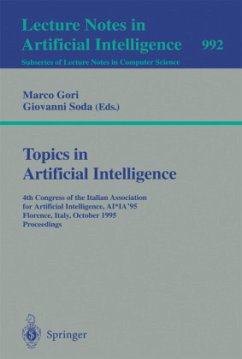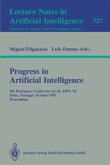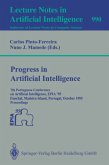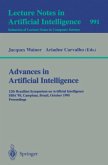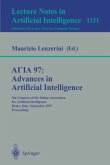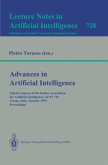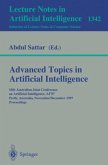GoriFourth Congress of the Italian Association for Artificial Intelligence, AI*IA '95, Florence, Italy, October 11 - 13, 1995. Proceedings
Topics in Artificial Intelligence
Fourth Congress of the Italian Association for Artificial Intelligence, AI*IA '95, Florence, Italy, October 11 - 13, 1995. Proceedings
Herausgegeben:Gori, Marco; Soda, Giovanni
GoriFourth Congress of the Italian Association for Artificial Intelligence, AI*IA '95, Florence, Italy, October 11 - 13, 1995. Proceedings
Topics in Artificial Intelligence
Fourth Congress of the Italian Association for Artificial Intelligence, AI*IA '95, Florence, Italy, October 11 - 13, 1995. Proceedings
Herausgegeben:Gori, Marco; Soda, Giovanni
- Broschiertes Buch
- Merkliste
- Auf die Merkliste
- Bewerten Bewerten
- Teilen
- Produkt teilen
- Produkterinnerung
- Produkterinnerung
This book presents the refereed proceedings of the 4th Congress of the Italian Association for Artificial Intelligence, AI_IA '95, held in Florence, Italy, in October 1995. The 31 revised full papers and the 12 short presentations contained in the volume were selected from a total of 101 submissions on the basis of a careful reviewing process. The papers are organized in sections on natural language processing, fuzzy systems, machine learning, knowledge representation, automated reasoning, cognitive models, robotics and planning, connectionist models, model-based reasoning, and distributed artificial intelligence.…mehr
Andere Kunden interessierten sich auch für
![Progress in Artificial Intelligence Progress in Artificial Intelligence]() FilgueirasProgress in Artificial Intelligence39,99 €
FilgueirasProgress in Artificial Intelligence39,99 €![Progress in Artificial Intelligence Progress in Artificial Intelligence]() Pinto-FerreiraProgress in Artificial Intelligence39,99 €
Pinto-FerreiraProgress in Artificial Intelligence39,99 €![Advances in Artificial Intelligence Advances in Artificial Intelligence]() WainerAdvances in Artificial Intelligence39,99 €
WainerAdvances in Artificial Intelligence39,99 €![Distributed Artificial Intelligence Meets Machine Learning Learning in Multi-Agent Environments Distributed Artificial Intelligence Meets Machine Learning Learning in Multi-Agent Environments]() Distributed Artificial Intelligence Meets Machine Learning Learning in Multi-Agent Environments39,99 €
Distributed Artificial Intelligence Meets Machine Learning Learning in Multi-Agent Environments39,99 €![AI*IA 97: Advances in Artificial Intelligence AI*IA 97: Advances in Artificial Intelligence]() LenzeriniAI*IA 97: Advances in Artificial Intelligence39,99 €
LenzeriniAI*IA 97: Advances in Artificial Intelligence39,99 €![Advances in Artificial Intelligence Advances in Artificial Intelligence]() TorassoAdvances in Artificial Intelligence39,99 €
TorassoAdvances in Artificial Intelligence39,99 €![Advanced Topics in Artificial Intelligence Advanced Topics in Artificial Intelligence]() Advanced Topics in Artificial Intelligence39,99 €
Advanced Topics in Artificial Intelligence39,99 €-
-
-
This book presents the refereed proceedings of the 4th Congress of the Italian Association for Artificial Intelligence, AI_IA '95, held in Florence, Italy, in October 1995.
The 31 revised full papers and the 12 short presentations contained in the volume were selected from a total of 101 submissions on the basis of a careful reviewing process. The papers are organized in sections on natural language processing, fuzzy systems, machine learning, knowledge representation, automated reasoning, cognitive models, robotics and planning, connectionist models, model-based reasoning, and distributed artificial intelligence.
The 31 revised full papers and the 12 short presentations contained in the volume were selected from a total of 101 submissions on the basis of a careful reviewing process. The papers are organized in sections on natural language processing, fuzzy systems, machine learning, knowledge representation, automated reasoning, cognitive models, robotics and planning, connectionist models, model-based reasoning, and distributed artificial intelligence.
Produktdetails
- Produktdetails
- Lecture Notes in Computer Science 992
- Verlag: Springer / Springer Berlin Heidelberg / Springer, Berlin
- Artikelnr. des Verlages: 978-3-540-60437-2
- 1995.
- Seitenzahl: 472
- Erscheinungstermin: 27. September 1995
- Englisch
- Abmessung: 235mm x 155mm x 26mm
- Gewicht: 623g
- ISBN-13: 9783540604372
- ISBN-10: 3540604375
- Artikelnr.: 09230086
- Herstellerkennzeichnung
- Springer-Verlag KG
- Sachsenplatz 4-6
- 1201 Wien, AT
- ProductSafety@springernature.com
- Lecture Notes in Computer Science 992
- Verlag: Springer / Springer Berlin Heidelberg / Springer, Berlin
- Artikelnr. des Verlages: 978-3-540-60437-2
- 1995.
- Seitenzahl: 472
- Erscheinungstermin: 27. September 1995
- Englisch
- Abmessung: 235mm x 155mm x 26mm
- Gewicht: 623g
- ISBN-13: 9783540604372
- ISBN-10: 3540604375
- Artikelnr.: 09230086
- Herstellerkennzeichnung
- Springer-Verlag KG
- Sachsenplatz 4-6
- 1201 Wien, AT
- ProductSafety@springernature.com
Natural Language Generation as constraint-based configuration.- Issues of multilinguality in the automatic generation of administrative instructional texts.- Extending Q-learning to Fuzzy Classifier Systems.- Fuzzy cognitive maps in multi-agent environments.- Multiple predicate learning with RTL.- Learning while -Solving problems in single agent search: Preliminary results.- Automatic construction of navigable concept networks characterizing text databases.- Temporal prediction: Dealing with change and interactions within a causal framework.- Non-first-order features in concept languages.- PDL-based framework for reasoning about actions.- Dependency graphs in natural language processing.- Integrating shallow and linguistic techniques for Information extraction from text.- Recognizing preliminary sentences in dialogue interpretation.- Contextuality and non-extensional identity: the inescapable symbiosis in NLP.- Priorities in Default Logic revisited.- Boolean approach for representing and solving constraint-satisfaction problems.- Composing decision procedures: the approach and a case study.- Knowledge representation, exemplification, and the Gupta-Belnap theory of circular definitions.- $$mathcal{T}mathcal{R}mathcal{D}mathcal{L}$$ : A language for conceptual modelling in Information Systems Engineering.- The different roles of abstraction in abductive reasoning.- A cognitive model of causal reasoning about the physical world.- A generalized approach to consistency based belief revision.- A framework for dealing with belief-goal dynamics.- Evolving non-trivial behaviors on real robots: An autonomous robot that picks up objects.- A formal domain description language for a temporal planner.- A method for solving multiple autonomous robots collisions problem usingspace and time representation.- Mapping symbolic knowledge into locally receptive field networks.- Knowledge representation for robotic vision based on conceptual spaces and attentive mechanisms.- A weakest precondition semantics for conditional planning.- A cognitive hybrid model for autonomous navigation.- Using a chemical metaphor to implement autonomous systems.- Modeling process diagnostic knowledge through causal networks.- Formalizing reasoning about change: A temporal diagnosis approach.- Preventive diagnosis: Definition and logical model.- Learning programs in different paradigms using Genetic Programming.- Revision of logical theories.- Reformulation of examples in concept learning of structural descriptions.- Integrated Model - A Proposal to handle noise.- Exceptions-based synthesis of Boolean functions as a core mechanism to perform concept learning.- Seeing is believing.- Agents as reasoners, observers or believers.- Modelling interactions in agent system.- Agent coordination and control through logic theories.
Natural Language Generation as constraint-based configuration.- Issues of multilinguality in the automatic generation of administrative instructional texts.- Extending Q-learning to Fuzzy Classifier Systems.- Fuzzy cognitive maps in multi-agent environments.- Multiple predicate learning with RTL.- Learning while -Solving problems in single agent search: Preliminary results.- Automatic construction of navigable concept networks characterizing text databases.- Temporal prediction: Dealing with change and interactions within a causal framework.- Non-first-order features in concept languages.- PDL-based framework for reasoning about actions.- Dependency graphs in natural language processing.- Integrating shallow and linguistic techniques for Information extraction from text.- Recognizing preliminary sentences in dialogue interpretation.- Contextuality and non-extensional identity: the inescapable symbiosis in NLP.- Priorities in Default Logic revisited.- Boolean approach for representing and solving constraint-satisfaction problems.- Composing decision procedures: the approach and a case study.- Knowledge representation, exemplification, and the Gupta-Belnap theory of circular definitions.- $$mathcal{T}mathcal{R}mathcal{D}mathcal{L}$$ : A language for conceptual modelling in Information Systems Engineering.- The different roles of abstraction in abductive reasoning.- A cognitive model of causal reasoning about the physical world.- A generalized approach to consistency based belief revision.- A framework for dealing with belief-goal dynamics.- Evolving non-trivial behaviors on real robots: An autonomous robot that picks up objects.- A formal domain description language for a temporal planner.- A method for solving multiple autonomous robots collisions problem usingspace and time representation.- Mapping symbolic knowledge into locally receptive field networks.- Knowledge representation for robotic vision based on conceptual spaces and attentive mechanisms.- A weakest precondition semantics for conditional planning.- A cognitive hybrid model for autonomous navigation.- Using a chemical metaphor to implement autonomous systems.- Modeling process diagnostic knowledge through causal networks.- Formalizing reasoning about change: A temporal diagnosis approach.- Preventive diagnosis: Definition and logical model.- Learning programs in different paradigms using Genetic Programming.- Revision of logical theories.- Reformulation of examples in concept learning of structural descriptions.- Integrated Model - A Proposal to handle noise.- Exceptions-based synthesis of Boolean functions as a core mechanism to perform concept learning.- Seeing is believing.- Agents as reasoners, observers or believers.- Modelling interactions in agent system.- Agent coordination and control through logic theories.

